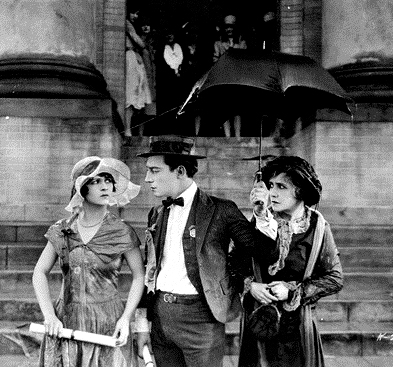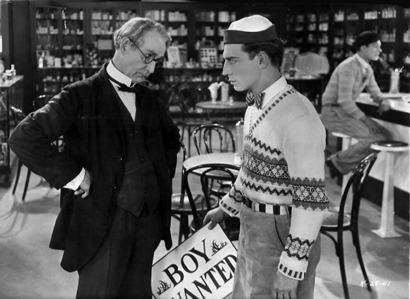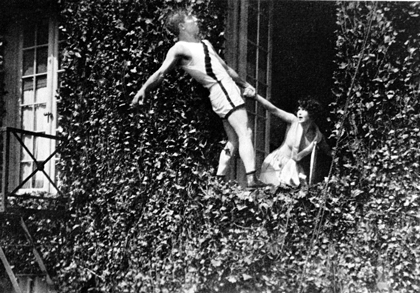
 |
|
|
|
Buster Keaton's The General is a masterpiece in every sense of the word, an almost perfect movie as well as an innovative and ambitious comedy based on a very serious incident of the Civil War. Astonishingly, it wasn't reviewed well upon its release and wasn't a big moneymaker. It proved to be the last film over which Keaton would exercise complete control. Keaton's business manager changed, allowing producer Joseph M. Schenck to burden Keaton with writers he didn't know, and even choose a director. Keaton was able to largely ignore the new director but he could do nothing about his reduced creative circumstances. The General was a lavish production filmed on location in Oregon, but the relatively small-scale College is a simple slapstick story in modern dress. The show lacks the large set pieces or mechanical contrivances beloved by Keaton, and there is only one brief flourish of cinematic daring. Just the same, the opportunity to enjoy over an hour of Keaton's unique physical comedy is nothing to sniff at. The film is all Keaton, and it delivers plenty of laughs. 
At first look College resembles an ordinary silent comedy by any number of lesser comedians; it's practically a carbon copy of Harold Lloyd's The Freshman. Bookish High School Senior Ronald (Buster) is humiliated at his graduation ceremony. While making an unpopular anti-athletics speech, his cheap suit shrinks until its buttons pop and its seams split. Worse, Ronald's speech offends the beautiful Mary (Anne Cornwall), who is popular with all the boys but gravitates toward Jeff (Harold Goodwin), an arrogant jock. Walking home in the pouring rain, Ronald tells his mother (Florence Turner) that he's going to attend the ritzy Claydon College, to be near Mary. At school Ronald finds himself cruelly ostracized by the other students, and his attempts to find a job to pay his tuition don't go well. The Dean (Snitz Edwards) is dismayed to find Ronald trying to excel in various sports. He samples baseball and most of the track and field specialties but is a dismal failure. To raise Ronald's spirits, the Dean forces the coach of the rowing team to make him the cockswain for the big race. Mary finds herself hoping that Ronald will finally do something right. The jealous Jeff traps Mary in her room. He's already been expelled from Claydon, and his aim is to get Mary expelled as well, to force her to marry him. Mary phones a desperate plea for help -- and Ronald takes the call! College is no masterpiece; it doesn't even have a well constructed story. Buster goes through a number of comic episodes at school before triumphing in a sudden burst of athletic competence. The only theme in sight is the opposition of education and athletics in education. The High School faculty is enraptured by Ronald's speech even as the students and parents desert the hall. At Claydon, the Dean bemoans the fact that his campus is "infested" with athletes. Jus the same, every episode gets big laughs. Realizing that his shrinking suit is self-destructing, Ronald moves behind a table and stands a book in front of his crotch: "Where would I be without my books?" It's as close as Buster ever got to ribald humor. After watching a crack soda jerk toss malt shakers and scoops of ice cream about like a juggler, Ronald tries to emulate him and makes a terrible mess. He answers an ad for "colored waiters" and works in blackface, attracting the amorous attention of a black cook (Madame Sul-Te-Wan). Then the other kitchen staffers discover that he's painted, and come after him with meat cleavers. 1 Besides giving the show his usual blank-faced acceptance of failure, Keaton works out some cute gags on the baseball and track fields, with the help of his technician-collaborators Fred Gabourie and Dev Jennings. Keaton loved baseball, and for one marvelous gag Ronald hits an impossibly high fly ball, which stays in the air long enough for him to run all the bases. When the short stop catches it, Ronald is told that he's forced out two runners on base before him, and is also out himself. Even when gags with the long jump and pole vault seem like standard material, Keaton puts a hilarious spin on each belly flop or wildly tossed javelin. At the high jump he clears a not-very-high bar in a variety of ridiculous poses. When he falls right on his nose, his pain seems very real. 
Don't look for stylish story structure here. Ronald is a total klutz, and then he isn't -- and the only reason for his sudden advance to a higher degree of coordination is that he's inspired by Mary's encouragement. The lightning-fast ending pays off the earlier episodes as Ronald races to the rescue. Along the way to Mary's room he performs feats of athleticism (jumping hedges like hurdles, etc.) that previously defeated him. Keaton's background was show business; I'm not sure if he ever attended school at all. He's therefore truly out of his element in a college setting and had no experience in formal athletic competition. This makes it all the more marvelous to see his natural talent for physical stunts displayed so effectively. It also seems good to know that Keaton wasn't Superman: one doesn't master pole vaulting with just a couple of days of practice. The most famous story about College is that Buster quickly decided that he was never going to be able to do his own stunt pole-vault. He hired a pro to perform the biggest gag in the movie, when Ronald pole-vaults right into Mary's second-floor dorm window. Not mentioned much but impressive to this viewer is a technical trick used when Buster's rowdy classmates use a blanket to toss him into the air. In an unbroken shot Buster goes up at normal speed, but opens his umbrella and falls down in slow motion. Today's cameras can change speed in mid-shot by more than one means, sometimes with automatic and programmable frame rate/shutter/exposure adjustments (as in the opening and closing shots of The Insider). Unless I'm misreading the film, and an early optical printer was used, it looks as if Buster's cameramen changed the frame rate and camera shutter manually, on the fly. Barring that detail, College doesn't have much in the way of cinematic innovation. The story is a big step down from masterpieces like The General and Sherlock Jr.. This is just a guess, but I have a mental image of Keaton, forced to compromise throughout the production, digging in his heels to insist on keeping the film's bizarre, mordant conclusion. The ending breaks entirely with what has come before. College concludes almost exactly like a Harold Lloyd picture: Ronald wins the race, defeats the dastardly villain and wins the girl. Then, in four very weird quick dissolves Keaton upends the cheery optimism, as if the film had been suddenly hijacked by cartoonist Charles Addams. The ending of College is no big secret and is described in almost every review, but I won't divulge it. In a long-ago screening at UCLA with Chauncey Haines on the theater organ, happy applause at the conclusion suddenly gave way to a big "Ohh!" from the audience, followed by nervous laughter. Keaton was a subversive genius. 
Keaton was able to make one more big-scale comedy (Steamboat Bill, Jr.) before his ill-chosen move to MGM signaled the rapid destruction of his film style, his marriage and his career. College may be the least of his silent features, but it's still a superior comedy. Kino Lorber's Blu-ray of College is an excellent encoding of a film in better than average shape. A few shots revert to inferior quality sources, but they never detract from the flow of the picture or our appreciation of the comedy. A faint horizontal printing line crosses the frame very near the bottom of the screen throughout; this artifact must have been created at some dupe printing step, long ago. The show carries an engaging John Muri organ score recorded in 1992. Kino producer Bret Wood keeps the extras list short. Silent film festival director Rob Farr provides a commentary that's good for facts and background -- the actress playing Buster's mother, Florence Turner, was one of the very first official film stars way back in the early 'teens. But Farr is also too defensive about College's low roost among the Keaton silents. Come on, they can't all be miracles of genius and innovation. The amiable John Bengtson offers another lavishly detailed featurette nailing down College's exact filming locations in and around Hollywood, U.S.C. and another L.A. area campus. Finishing the extras is a 30-minute Canadian film about workplace safety called The Scribe, in which a janitor (Keaton in his last film appearance) takes a reporter's place to investigate a work site plagued with accidental injuries. Don't expect any wild stunts, but Keaton does put himself in what look like fairly precarious situations -- high up in a half-built skyscraper.
On a scale of Excellent, Good, Fair, and Poor,
College Blu-ray rates:
Footnote:
1. In my book Keaton gets a pass for the streak of mild racist humor that runs through his films. His vaudeville background accepted blackface as legit theater without overt mocking of blacks. The jokes in his films with African Americans are almost always mistaken-identity based, not derogatory. The other black waiters in College, for instance, are neither shuffle bums nor dim-witted.
Reviews on the Savant main site have additional credits information and are often updated and annotated with footnotes, reader input and graphics.
Review Staff | About DVD Talk | Newsletter Subscribe | Join DVD Talk Forum |
| ||||||||||||||||||